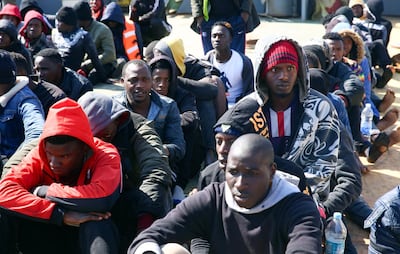For years, Libya's people have needed most of all a stable national government that can deliver basic services and protect their basic rights. In the cruel course of the country's six-year conflict, that is precisely what has proven hardest to achieve.
In a rare and early step towards forming one, the nation's parliament on Wednesday approved a new unity cabinet, after months of difficult negotiations. The interim Government of National Unity will be led by Prime Minister-designate Abdul Hamid Dbeibah, a 61-year-old businessman.
After the chaos of the past six years, the main achievement of the negotiations is the simple fact that a national administration now exists.
The GNU emerged from a tragic context, which began with the toppling of the country's dictator, Muammar Qaddafi, who for four decades controlled with maniacal obsession every aspect of the Libyan state. When the Arab uprisings spread to Libya in 2011 and Nato intervened militarily – resulting in Qaddafi's demise – this chapter in the country's history swiftly ended. What followed was a state that for years has been on the brink of failure.
Rival factions – one being the western-based Government of National Accord, the other in the east under Field Marshal Khalifa Haftar, head of the Libyan National Army – set up parallel administrations as they fought for control of the country. Foreign states soon joined the fray, each backing a particular side and creating a stalemate from which no functional government could emerge.
Criminals, militias, people smugglers and terrorists have all flourished in the vacuum. Throughout the migrant crisis, Libya has been a major transit point to the EU. When crossings failed, bankrupt migrants would be held indefinitely in camps rife with disease and abuse. Even as ISIS was on the back foot in Syria and Iraq, Libya acted as its safe haven from which to regroup and plan global attacks.
Staggering levels of corruption have developed among some of the higher ranks of Libya's political class. In light of this, the GNU's second biggest achievement has been recognising the need for a small cabinet made up of lesser-known political figures not tainted with the toxic politics of recent history.
But the caretaker cabinet's low profile and inexperience is also where some of its biggest challenges will lie. Shepherding Libya towards national elections in December will require dexterity. In the intervening time, it will also have to draft a new constitution that represents all Libyans. Representation has had some early victories; the cabinet includes Libya's first ever female foreign minister, as well as four other women in ministerial positions.
It will also need to reintroduce the concept of centralised government. It will not be easy to unite Libya's institutions, defence and security capabilities and the health and social support networks that are so vital to tackling its challenges. So far, the armed forces of both sides in the nation's conflict have not said whether they will follow GNU leadership, but they should if Libya is ever to function cohesively again. The international community must also support this government and work towards ending foreign interference that supports political rivals.
If it fails, the GNU, at best, risks becoming a government in name only. At worst, it may simply disappear into a new wave of civil strife. Despite its fragility, it is the only hope for progress in Libya right now.



